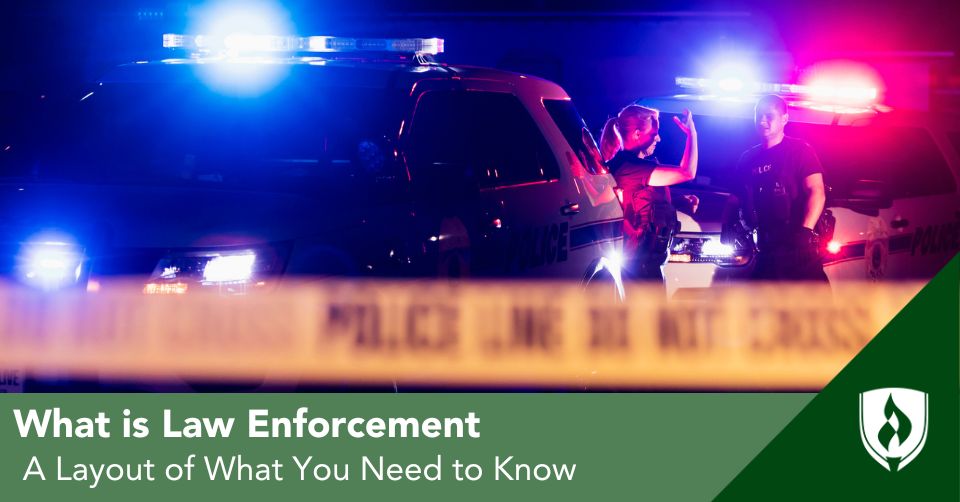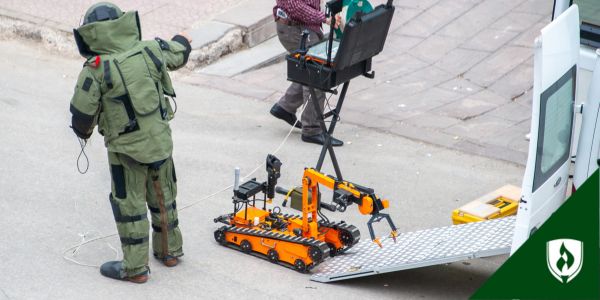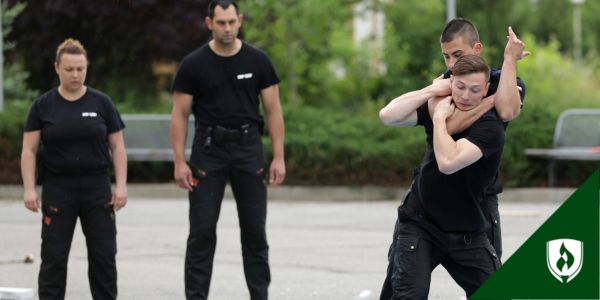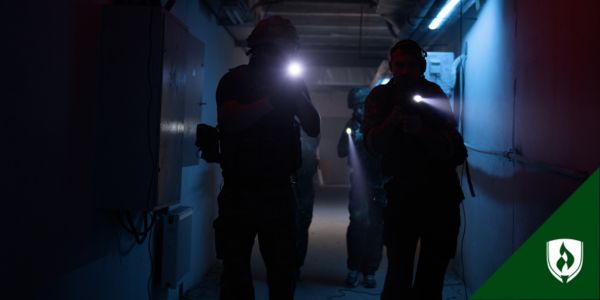
Law enforcement is a fundamental component of any functioning society. It plays a critical role in ensuring public safety and upholding the rule of law. Thanks to law enforcement, we can go about our daily lives, knowing there are dedicated professionals working to protect us and our communities.
Police officers do a lot more than just arrest people. They respond to emergencies, help prevent crime and build relationships within the community. They’re the ones you call when you’re in trouble, and they’re always there to lend a hand.
If you're asking what is law enforcement, and what does it cover, read on! Law enforcement offers roles where you can make a real difference in your community. It’s a profession that demands courage, integrity, and a strong commitment to service, and for that reason, many people pursue a degree in law enforcement to get the training they need.
Rasmussen University’s Law Enforcement Certificate and Law Enforcement Associate’s degree program are not aligned to the standards of any professional licensing body other than the MN POST and is not intended to satisfy professional licensure requirements of any professional licensing agency in any other state. Graduates of Rasmussen University’s Law Enforcement Associate’s degree program and Law Enforcement Certificate may need to complete additional requirements before becoming eligible to sit for the MN Peace Officer Licensing Exam. As requirements may vary among federal, state, and local law enforcement agencies, it is important to consult the specific requirements of any agency at which employment may be sought.
Law enforcement students develop a wide range of skills, from critical thinking and problem-solving to effective communication and teamwork.
You could be a part of this dedicated community of professionals who support each other and share a common goal to protect and serve the public. Whether you're interested in patrol work, investigations, or community outreach, there’s a place for you in law enforcement. Curious about what types of law enforcement careers you can consider? read more here.
Law enforcement defined
In a general definition, law enforcement is any system through which society enforces its laws. The clue is in the name.
But enforcing even one law across an entire nation is complicated, let alone the vast array of laws we have today. The effort involves various agencies and law enforcement officials, such as police officers with many different ranks, roles and areas of focus. (For more on that, check out Police Ranks: Breaking Down 8 Different Law Enforcement Positions.)
Along with law enforcement, these professionals are often the first responders in emergencies, providing assistance for the safety of the community.
Law enforcement also encompasses investigative work, where officers gather evidence, solve cases, and bring perpetrators to justice. This aspect of their role is crucial in upholding the rule of law and maintaining societal order.
5 Main functions of law enforcement
Understanding the responsibilities and functions of law enforcement helps to appreciate the diverse roles these professionals play in our society. From maintaining public order to engaging in complex investigations, law enforcement officers are at the forefront of ensuring safety and justice.
Here is a list of some of the primary responsibilities of law enforcement personnel:
1. Community policing
Officers serve as the first line of defense against criminal activities. Their presence alone can act as a deterrent to potential offenders, reducing the likelihood of crimes occurring. In emergencies, law enforcement officers respond swiftly to provide immediate assistance, manage the situation, and restore order.
This responsibility extends to managing public events, controlling crowds, and ensuring that community spaces remain safe and peaceful. By maintaining public order, law enforcement creates an environment where individuals can go about their daily lives with a sense of security and stability.
Law enforcement agencies often engage in community policing, which involves building relationships with community members to proactively address the causes of crime and social disorder. This helps law enforcement agencies gain valuable insights into community concerns, foster mutual trust and cooperation and develop tailored strategies that address specific local issues.
Law enforcement agencies also conduct investigations when crimes occur, they gather evidence, interview witnesses, and solve cases to bring perpetrators to justice. This investigative work is crucial for upholding the rule of law and ensuring that offenders are held accountable for their actions.
2. Specialized units
Law enforcement includes specialized units such as SWAT teams, cybercrime units, and narcotics divisions that handle specific types of crime and complex situations.
Specialized units within law enforcement agencies focus on specific types of crimes, such as cybercrime, drug trafficking, and financial fraud, ensuring that all aspects of the law are upheld. By enforcing legal regulations, law enforcement protects the rights and freedoms of citizens while maintaining societal order.
3. Collaboration with other agencies and the public
Municipal police departments often collaborate with other governmental and non-governmental organizations, such as social services, public health departments, and federal agencies to address broader issues that affect public safety.
Building trust and engaging with the community significantly contributes to community stability and economic growth. Officers work closely with residents to address local concerns, enhance public safety, and foster mutual respect and cooperation. Building trust with the community encourages cooperation with investigations and helps develop strategies to meet specific needs, creating a more collaborative environment.
A safe and secure community environment is crucial for societal stability and economic growth. When communities feel safe, businesses thrive, investments increase, and economic development is stimulated.
4. Regulatory and compliance enforcement
Some law enforcement agencies also focus on regulatory and compliance enforcement, where they ensure that businesses and individuals adhere to state laws and regulations, such as environmental laws and financial regulations.
This helps to enforce state law by monitoring compliance, investigating violations, and taking appropriate action to maintain legal standards and protect public interests.
5. Crime prevention programs
Law enforcement agencies often run or participate in crime prevention programs and initiatives, such as the Neighborhood Watch, which are aimed at educating the public and reducing the incidence of crime.
Prevention and investigation of crimes are core responsibilities of law enforcement. Prevention strategies include visible patrols, community policing, and engagement in crime prevention programs that educate the public on safety practices.
Law enforcement vs. other parts of the criminal justice system
There is often confusion between the different disciplines within the criminal justice system, with many people using terms like law enforcement, judiciary and corrections interchangeably. However, each of these plays a distinct role and serves unique functions.
Law enforcement agencies are responsible for investigating crimes, apprehending suspects, and maintaining public order.
The judiciary consists of courts and related legal entities, including judges, prosecutors, and defense attorneys. Their primary role is to interpret and apply the law. They handle the prosecution of criminal cases, mediate disputes, and determine the guilt or innocence of defendants, as well as issue sentences.
Corrections encompasses the systems and institutions that manage individuals who have been convicted of crimes. This includes prisons, jails, probation, and parole systems.
Federal vs. local law enforcement agencies
The role of law enforcement is very different depending on which agency you consider.
Understanding the various types of law enforcement agencies can help clarify their distinct roles and responsibilities within the criminal justice system. These agencies operate at different levels, each focusing on specific aspects of law enforcement and public safety.
Below are examples of ten different law enforcement agencies, categorized into federal and local levels.
Federal law enforcement agencies
- Federal Bureau of Investigation (FBI) - Investigates federal crimes, including terrorism, cybercrime, and organized crime.
- Drug Enforcement Administration (DEA) - Enforces laws related to controlled substances and combats drug trafficking.
- Bureau of Alcohol, Tobacco, Firearms, and Explosives (ATF) - Regulates and investigates crimes involving firearms, explosives, arson, and illegal trafficking of alcohol and tobacco.
- United States Secret Service (USSS) - Protects national leaders and investigates financial crimes, including counterfeiting and fraud.
- Department of Homeland Security (DHS) - Oversees multiple agencies focused on protecting the country from various threats, including terrorism and natural disasters.
Local law enforcement agencies
- Municipal/Local Police Departments - A typical local law enforcement agency serves specific cities or towns, they investigate local crimes, enforce traffic laws, and engage in community policing.
- Sheriff's Offices - Operate at the county level, managing county jails, serving legal documents, and providing law enforcement services in unincorporated areas.
- State Police/Highway Patrol - Enforce traffic laws on state highways, provide statewide law enforcement support, and assist local agencies.
- Campus Police - Provide security and law enforcement services on college and university campuses.
- Transit Police - Ensure the safety and security of public transportation systems, including buses, trains, and subways.
What does public safety mean to you?
Law enforcement careers are a powerful way to be the change you want to see in the world. Professionals who get into this field often do so because they want to make their communities safer.
Education for these careers also tends to be hands-on with lots of variety. If that’s something that might interest you, check out 8 Things You Didn't Know About the Rasmussen University Law Enforcement Program.
Rasmussen University’s Law Enforcement Certificate and Law Enforcement Associate’s degree program are not aligned to the standards of any professional licensing body other than the MN POST and is not intended to satisfy professional licensure requirements of any professional licensing agency in any other state. Graduates of Rasmussen University’s Law Enforcement Associate’s degree program and Law Enforcement Certificate may need to complete additional requirements before becoming eligible to sit for the MN Peace Officer Licensing Exam. As requirements may vary among federal, state, and local law enforcement agencies, it is important to consult the specific requirements of any agency at which employment may be sought.




